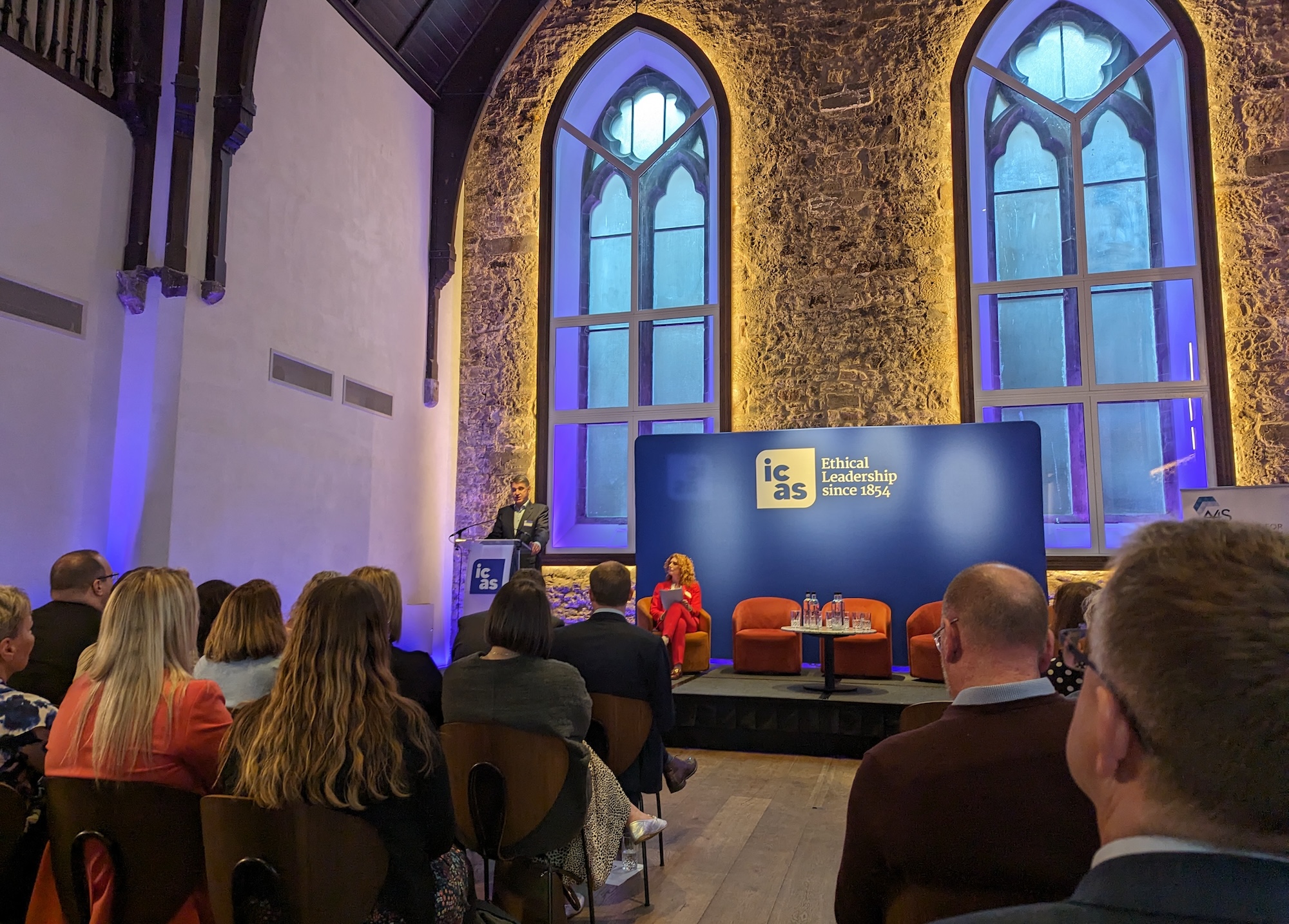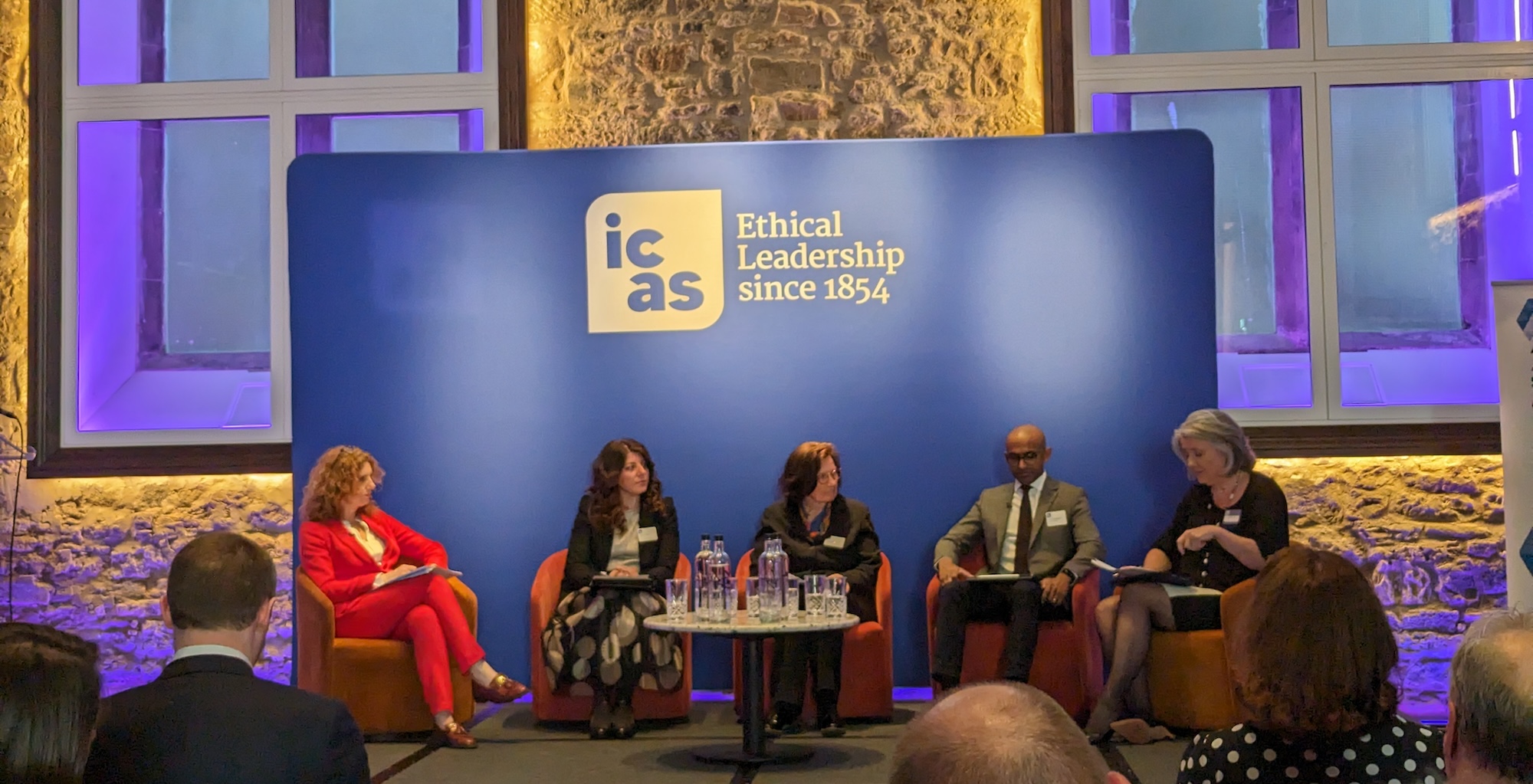ICAS sustainability summit brings together regulatory experts and business leaders

Clive Bellingham CA speaking on stage at the start of the evening (Image credit: George Iordanov-Nalbantov)
Scotland’s finance professionals and businesspeople gathered at ICAS’ second Sustainability Summit to discuss ever-increasing sustainability and ESG reporting requirements.
Held in collaboration with Accounting for Sustainability (A4S) at Edinburgh’s Virgin Hotel, the event followed on from the inaugural Sustainability Summit event in London.
This year’s summit delved deeper into the pressing need for businesses to adopt and implement sustainability frameworks.
Speakers and panelists from various industries offered insights into the future of sustainable business, the role of technology in climate transition, and simplifying sustainability reporting complexities.

Pictured (L-R): Host Dr Vanessa Collingridge, with panelists Martina Tessari, Hilde Blomme, Ravi Abeywardana, Fiona Donnelly CA (Image credit: George Iordanov-Nalbantov)
The event was opened by Clive Bellingham CA, outgoing ICAS president, and hosted by broadcaster and journalist Dr Vanessa Collingridge, who managed the summit’s two panel sessions.
The first panel saw Martina Tessari, head of Europe and global reporting lead at A4S, Hilde Blomme of Accountancy Europe, director of strategic affairs and capacity building at the IFRS Foundation Ravi Abeywardana, and ICAS’ head of sustainability Fiona Donnelly CA discuss the evolving landscape of sustainability reporting and financial matters.
With 75% of UK investors now screening their investments for their sustainability or ESG credentials, Ms Tessari stressed that robust sustainability reporting can create value and help inform decision-making. Mr Abeywardana added that sustainability reporting is a communication tool that can “unlock a tremendous amount of capital”, as well as mitigate risks.

Pictured (L-R): Host Dr Vanessa Collingridge, with the second panel's speakers Peter Norton CA, Dr Marc Lepere, and Alison Cornwell CA (Image credit: George Iordanov-Nalbantov)
The second panel featured NatWest Group’s director of finance Peter Norton CA, Dr Marc Lepere of Omnevue, and Alison Cornwell CA, CFO of Vue International and newly elected president of ICAS, who shared their experiences and expertise on how businesses can record and integrate new measures to foster a more sustainable future.
Ms Cornwell explained that getting customers to engage with a business’s green agenda can be used as a “virtue that resonates with customers”, encouraging positive behaviours as well as loyalty. She gave examples, including adding signs in toilets to explain to customers why their hand dryers have cold air instead of warm, providing a 95% saving on energy use.
Panellists agreed that economic incentives, and greater policy certainty from the government, are needed to encourage real behavioural change and realise these opportunities. Mr Norton said that “policy certainty is one of the things that businesses want more than anything. Dr Lepere branded the climate crisis as a “super wicked problem”, describing the government’s lack of sustainability action as “a crisis of leadership”.
In addition to networking opportunities, the summit marked the launch of ICAS’ sustainable business network, providing a collaborative platform for professionals to exchange ideas and support each other in taking sustainable actions.
The event underscored the urgent need for collective action to address sustainability challenges and equipped attendees with practical insights to navigate the evolving sustainability landscape.








